UNDERGRADUATE RESEARCH BLOGS
The Office of Undergraduate Research sponsors a number of grant programs, including the Circumnavigator Club Foundation’s Around-the-World Study Grant and the Undergraduate Research Grant. Some of the students on these grants end up traveling and having a variety of amazing experiences. We wanted to give some of them the opportunity to share these experiences with the broader public. It is our hope that this opportunity to blog will deepen the experiences for these students by giving them a forum for reflection; we also hope these blogs can help open the eyes of others to those reflections/experiences as well. Through these blogs, perhaps we all can enjoy the ride as much as they will.
EXPLORE THE BLOGS
- Linguistic Sketchbook
- Birth Control Bans to Contraceptive Care
- A Global Song: Chris LaMountain’s Circumnavigator’s Blog
- Alex Robins’ 2006 Circumnavigator’s Blog
- American Sexual Assault in a Global Context
- Beyond Pro-GMO and Anti-GMO
- Chris Ahern’s 2007 Circumnavigator’s Blog
- Digital Citizen
- From Local Farms to Urban Tables
- Harris Sockel’s Circumnavigator’s Blog 2008
- Kimani Isaac: Adventures Abroad and At Home
- Sarah Rose Graber’s 2004 Circumnavigator’s Blog
- The El Sistema Expedition
- The World is a Book: A Page in Rwand
Aspen Harter
Aspen Harter
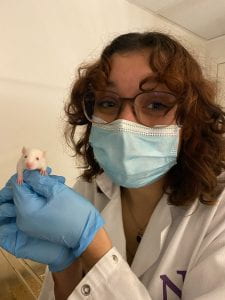
Summer URG
Please provide a brief summary of your research.
Through SURG I was able to continue conducting a project on acute stress and aggression through adolescence and adulthood. Previous work has shown that stress increases aggressive behaviors in adult male rats against non-threatening juvenile intruders during a social interaction test. The current study aims to investigate whether this stress-induced aggressive behavior is dependent on the age of the male (adolescence vs. adulthood) and the age of the intruder (juvenile or same-age). The project also uses two nearly isogenic strains that have been bred to express heightened/lowered stress reactivity or depression-like behavior. Through this model we are able to evaluate if the aggressive behaviors we are observing are due to genetic predisposition as opposed to a reaction to procedures.
What made you initially interested in researching your project in particular?
I think aggression and anger-based emotions in humans are painted in a unfairly negative light. It evolved as an alert or protection system in our history, and is simply a biological response. That being said there are a lot of behavioral disorders were an un-acceptable amount of aggression is produced and can be harmful to that person and/or the people around them. By looking at how stress through development affects aggressive behaviors in those with a predisposition to stress reactivity (as well as in general) we might be able to understand more about what is actually going on and how to properly address it.
What made you interested in pursuing (interdisciplinary) research more broadly?
I’ve always been very curious about what makes a person themselves. For a while I was content just reading paper and learning about neuroscience and psychology in classes, but at a certain point the questions I was asking were being answered with “We don’t actually know” or “I don’t know if that’s understood yet”. I decided I wanted to join a lab so I could start answering my questions myself, and after the first few months there I just fell in love with the day-day life of the job as well. Truly at this point I do research because its just fun.
Describe your experiences with research thus far. Was it tricky? What skills do you think you’ve gained?
Research is fun. Research also sucks a bit. Especially in this last summer, a lot of research is facing the fact that a test didn’t work, or the results look different than expected. While that can be exciting sometimes, sometimes its also just defeating. Over the years that I’ve been doing it though I’ve learned how to get back up, figure out what might’ve gone wrong, and do it better the next time. It is a very tricky thing and there are a lot of things to consider all the time, but that’s the fun of it I think. I used to describe myself as efficient, but doing research has made me more careful and diligent too.
Any tips or advice you have for students similar to you that are interested in pursuing undergraduate research?
I think everyone should spend time doing research. Its incredibly rewarding to get to pursue something that you are genuinely interested in. My biggest advice is to reach out to professors to get involved in their labs if you’re interested in their work! I think a lot of people find it scary, but the worst they can do is say no. Plus at Northwestern a lot of professors are here specifically to do research and are excited to engage with students interested as well.
What is something that you could give a 10 min presentation on right off the cuff?
Miley Cyrus’s career
What was your favorite childhood story (written, spoken, or film)?
The movie Hoodwinked
Kaitlyn Hung
Kaitlyn Hung
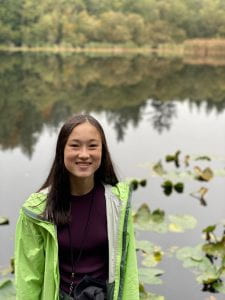
Which grant that you received do you want to talk about?
Summer URG
Please provide a brief summary of your research.
My project investigated why certain tissues are more susceptible to protein-misfolding diseases like Alzheimer’s and Huntington’s Disease. I identified genes that alter the ability to maintain protein homeostasis differently in different tissues. I use C. elegans, a microscopic nematode with a short lifespan and transparent body that allows me to visually watch individual proteins with colorful tags. My project’s findings illustrate that while maintaining protein homeostasis is essential to every tissue, individual components can differ from tissue to tissue, contributing to different susceptibilities to protein-misfolding diseases.
What made you initially interested in researching your project in particular?
I’m interested in the biological processes underlaying aging and age-related diseases. My project gets to the heart of this by looking at proteins, the basic molecular machines that carry out the processes we need to survive. Many labs focus on studying an individual tissue, and this project allowed me to more broadly understand how tissues vary. I also wanted to learn to work with a new model organism and C. elegans are frequently used to study aging biology.
What made you interested in pursuing (interdisciplinary) research more broadly?
Coming to Northwestern, I was interested in science but didn’t want to practice medicine. I wasn’t sure what other paths I could pursue until the professors in some of my earliest science classes talked about their research. I was excited to learn that I could apply the basic principles I was learning in class to discover something new to improve the world. When I started doing research, I was shocked that you could physically perform experiments and investigate interesting questions about biological concepts as a career!
Describe your experiences with research thus far. Was it tricky? What skills do you think you’ve gained?
Through my research project, I’ve gained technical skills in learning new genetic techniques and working with a different model organism. I’ve also learned to efficiently plan, carry out, troubleshoot, and communicate a research project, with the support of mentors. I grew through navigating challenges, like having to pivot my project midway through the summer due to unexpected changes in mentorship.
Any tips or advice you have for students similar to you that are interested in pursuing undergraduate research?
Jump in! You never know until you try it, and even if research isn’t your thing long-term, there are valuable skills to be gained. You are never stuck–you can always change research projects and labs if you discover interests in a different field, or if the environment isn’t a good fit. The hardest step is the first one!
What is something that you could give a 10 min presentation on right off the cuff?
“The Big 5” (Pacific Northwest Trees)
What was your favorite childhood story (written, spoken, or film)?
My Neighbor Totoro
Jeffrey Yuan
Jeffrey Yuan
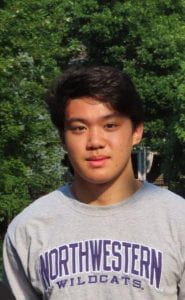
Conference Travel Grant
Please provide the tile and a brief summary of your research/conference presentation.
Learngle: Addition of an Analytics Dashboard to a Study Resource for the Clinical Informatics Board Exam
Learngle is an educational resource for clinical informatics that healthcare professionals use to prepare for the Clinical Informatics Board Exam. As of the 2023 exam cycle, we have over 50 user subscriptions and a 100% exam success rate. Learngle has a rich array of features that all actively contibute to the automation of generation of the most upto date information, provide detailed user performance analytics, and the utilization of a comprehensive ML algorithm to determing the optimal inter-repitition interval for each item in our educational resources.
What made you initially interested in researching your project in particular?
I initially became interested in my project when I found out about the field of clinical informatics. I had always wanted to integrate my interests in informatics and information theory with healthcare, and clinical informatics was my way to do so. I developed this project in order to increase the presence of this field, as with the evolving pool of technologies, understanding and implementing these resources are going to be critical for the future of patient care. This project serves to be an educational resource for healthcare professionals, whether it’s for their own personal education or for their preparation for the Clinical Informatics Board Exam.
What conference(s) did you present at and how did you find out about them?
I presented at the American Medical Informatics Association 2024 Informatics Summit. I found out about the conference through my lab at the Massachusetts General Hospital
What was it like presenting at a conference? Anything that you didn’t expect?
It was a great experience to be at the conference and see all the work that is being done with all the new technologies and data that are available in the healthcare scene. The conference was 4 days long, with a keynote speaker, oral presentations, expert panels, and poster sessions every day, but everything was something new that I hadn’t seen before. I didn’t expect for everyone to be so open to having conversations with me and connecting me with their colleagues, as I was definitely the minority as an undergraduate in such a highly acclaimed conference.
Any tips or advice you have for students similar to you that are interested in presenting at a conference one day?
I had a 30 minute oral presentation and systems demonstration. This initially made me nervous as I was expected to fill up the whole 30 minutes, so I had written up a script that I was memorizing and had planned out every action that I would take during my presentation. However, after actually getting into the presentation, I found that I had begun ignoring my script and premade plans, making me feel more comfortable on stage as everything came out naturally and not as if I was reciting a speech or reading a script. I would recommend that you don’t write up a comprehensive script and only develop a rough outline of everything you want to cover. You are the expert of your research so just go up and enjoy the experience.
Daniil Ozernyi
Daniil M. Ozernyi
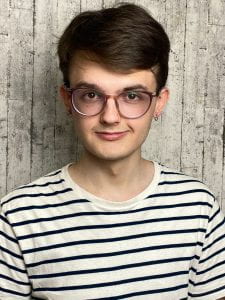
Conference Travel Grant
Please provide the tile and a brief summary of your research/conference presentation.
See the titles of several presentations below; my research has to do with language assessment, second language acquisition, and generative syntax.
What made you initially interested in researching your project in particular?
I have always been interested in language sciences, and so I try to maintain an interdisciplinary research agenda that explores many aspects of language, like language assessment, psycholinguistics, syntax, &c.
What conference(s) did you present at and how did you find out about them?
I was able to present the following papers or posters owing to the OUR conference travel grant:
Formalizing derivation and parsing components of minimalist syntax within first-order logic
[Paper] 第十届形式语言学国际研讨会 (ICFL-10), 清華大學, 北京.
Some remarks on sensitive periods and the methodological rigor of their examination
[Poster] International Joint Conference of APLX, ETRA40, and TESPA 2023.
On reliability of assessment and the use of rubrics to assess writing in a linguistic classroom
[Paper] 2023 Conference on Scholarly Teaching and SoTL in Linguistics (CoSTaSiL 23). July 2023, UMass-Amherst.
Multidominance in light of conflicting formalizations of minimalism and syntactic economy
[Paper] Workshop “How Many Mothers? Multidominance in Syntax”. UMass Amherst, June 24-25 2023.
DM Ozernyi, Haeun Kim, Taichi Yamashita, Suzanne Flynn. Validity and reliability of assessment used in second language acquisition studies
[Colloquium organizer] AAAL 2023. March 18.
Also, presentations for Midwest Slavic Conference, Okinawa chapter of Japanese TESOL, a few others; in the interest of space, I did not put their names here particularly because the work presented there was based on the presentations below.
Check the rest of Daniil’s conferences on his website!
What was it like presenting at a conference? Anything that you didn’t expect?
It is a great venue to present your work and connect with other researchers and get to know professors who will be reading your grad school application!
Any tips or advice you have for students similar to you that are interested in presenting at a conference one day?
I suggest that interested students submit their research. It can perhaps be difficult to submit for the first time, because of anxiety or impostor syndrome, but conference abstract submission usually provides an anonymous submission venue with relatively quick feedback and helpful comment from reviewers for the most fields. Indeed, it’s difficult to submit proposals that are theoretical; undergraduate students often do not have access to resources needed to run an experiment if they are not under a PI. Still, I strongly encourage students to submit!
Do you have a podcast/documentary/piece of shareable media related to your research? Post the link(s) to share here!
https://dozernyi.com, my ResearchGate profile https://www.researchgate.net/profile/Daniil-Ozernyi
What would you name a boat if you had one?
Styx
What is something that you could give a 10 min presentation on right off the cuff?
Pretty much anything to be honest, ranging from thin-layer chromatography to language and Ai to language teaching or any aspect of scientific study of language.
If your (speaking) voice were an instrument, what do you think it would be?
Oboe maybe? A violin? Idk.
What was a memorable interaction that you had on campus this week?
I had lunch with Sean Ebels-Duggan and we talked about Wittgenstein.
Ellie Garcia
Ellie Garcia

SURG
Please provide a brief summary of your research.
My research project looked into whether acoustic prosody differed between individuals with Fragile X Syndrome (FXS) and those with typical development. FXS results from an X-linked mutation of increase CGG DNA repeats in the FMR1 gene and is characterized by a wide range of symptoms, including intellectual disability and deficits in communication. Prosody refers to the rhythm, rate, and intonation of speech, and therefore is very important for communication. FXS is the most commonly known genetic condition associated with autism spectrum disorder (ASD), and while there is a wealth of research on prosodic abilities in ASD, there is not much for FXS. Wanting to address this research gap, I decided to focus in on the intonation of speech, which can be measured as the pitch of a person’s voice, and looked at how pitch variables compared between FXS and control participants for utterances with various communicative intents. Afterwards, I also looked at correlations between the pitch of FXS participants and FMR1-related genetic variations, hoping to gain a better understanding of the genetic underpinnings of FXS in relation to communication. I found that in certain speech contexts, individuals with FXS exhibited greater variation in their pitch than controls and there was a correlation between number of CGG repeats and pitch variation.
What made you initially interested in researching your project in particular?
I initially joined my lab because I had a strong interest in neurodevelopmental disorders after volunteering at a summer camp for kids with neurodivergence and/or physical disabilities throughout high school. Through journal clubs in my lab, I learned about FXS, and being a neuroscience major, I was fascinated by the processes causing the disorder. I also have a strong interest in both preventative and early care/therapy, so I was interested in studying prosody in FXS and looking for possible genetic markers of atypical prosody, which could theoretically be used as a factor for identify those who may benefit from early speech therapy.
What made you interested in pursuing (interdisciplinary) research more broadly?
I thought of research as a really great way to explore my interests more in depth! Additionally, it allows me to satisfy both my curiosity and my desire to feel like I’m contributing to something larger than myself. Knowing how much of an impact research findings make on policies, treatments, and people’s lives in general, makes it a really exciting opportunity to me.
Describe your experiences with research thus far. Was it tricky? What skills do you think you’ve gained?
I think the hardest part of research so far for me has been getting through the “grunt” work. I initially had a very idealized idea of what research would be, and thought it be super exciting all the time. However, I quickly realized that a lot of it can be very repetitive and a lot of number crunching for statistics. Despite that, it is a super rewarding process in the end, and it was really interesting to me to see the end results of all the statistics and to interpret my findings. I definitely improved my patience and persistence and also grew in my critical thinking and scientific writing skills throughout my research project.
Any tips or advice you have for students similar to you that are interested in pursuing undergraduate research?
Figure out a topic or research area that you’re really passionate about when looking for labs to join. I think it’s easy to get overwhelmed when looking up all the different research opportunities at Northwestern, but having an idea of what you’d be excited to do really helps to guide you in the process. Also, don’t be afraid to contact a bunch of different people, it never hurts to try to reach out!
What would you name a boat if you had one?
I would probably name it Dumpling, after my dog!
Naomi Aires
Naomi Aires
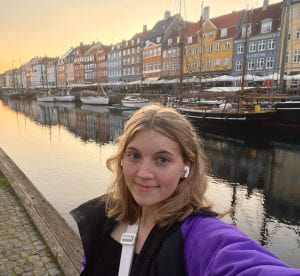
Which grant that you received do you want to talk about?
Summer URG
Please provide a brief summary of your research.
My SURG project investigated how musical timbre impacts the perception and memory of harmonic progressions. Working with Bienen professor Daniel Shanahan, I used the summer grant period to design the experiment, run it, analyze the results, and start a paper based on the findings. For the main experimental task, participants listened to chord progressions played by two contrasting timbres (electric guitar or piano) and then rearranged shapes (corresponding to each chord) to match what they heard. Half the progressions were nominally rock progressions, the other half followed classical music theory conventions. The aim of the experiment was to see if participants would make particular errors when reordering the chords and whether timbre/harmonic congruence would have any correlation with these errors.
What made you initially interested in researching your project in particular?
I’ve always had a big interest in harmony and I think especially after taking the Bienen music theory sequence, I became more curious how our perception of harmony may be impacted by other contextual factors.
What made you interested in pursuing (interdisciplinary) research more broadly?
Being a dual degree student, I’ve balanced coursework the last few years in two very different academic areas—cognitive/behavioral sciences and music. I’ve known for a while that I wanted to find a way to bridge my two interests, and I’m really fortunate that Northwestern is one of very few schools in the country with a music cognition department.
Describe your experiences with research thus far. Was it tricky? What skills do you think you’ve gained?
This summer was my first time ever conducting research and I definitely grew a lot from the experience. I’ve struggled a lot in the past with self-efficacy, and the research process overall helped me gain confidence in my academic abilities. More specifically, I grew more comfortable engaging with academic papers, programming in R, and working with basic stats procedures.
Any tips or advice you have for students similar to you that are interested in pursuing undergraduate research?
Don’t be intimidated and if you’re thinking about reaching out to a professor, just do it! Also try to be honest with yourself and pursue something you’re actually interested in; it will make the whole process more rewarding and enjoyable.
What is something that you could give a 10 min presentation on right off the cuff?
Kilwins Ice Cream Flavors Ranked Worst to Best (and what your favorite flavor says about you)
What was your favorite childhood story (written, spoken, or film)?
Ratatouille (still my favorite :))
Skyler Stone
Skyler Stone
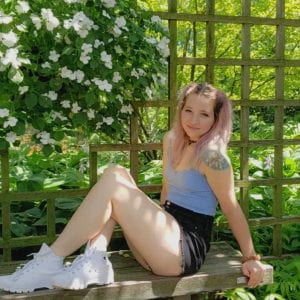
Which grant that you received do you want to talk about?
Summer URG
Please provide a brief summary of your research.
I studied the genetics behind the drug resistance of parasitic nematodes. Parasitic nematodes impact an estimated 1.5 billion people worldwide. Benzimidazoles, one of the primary drug classes used to treat parasitic nematode infections, target beta-tubulin in the microtubules in nematode cells. There is one gene that encodes for beta-tubulin that has been extensively studied, ben-1, but there are also five other genes that also encode for beta-tubulin that haven’t been as studied: tbb-1, tbb-2, tbb-4, tbb-6, and mec-7. I used CRISPR to knock out these genes in the model organism C. elegans in two different backgrounds, a wild-type and one with a ben-1 deletion already, and then conducted a variety of experiments to determine whether the gene has been deleted. Once that was confirmed, I ran a high-throughput assay to investigate the implications of these gene deletions on drug resistance by exposing these mutant strains to Albendazole, a specific benzimidazole. Data analysis is still underway, being done through R, but as of right now, it appears that only mutant strains with the ben-1 deletion were resistant to Albendazole.
What made you initially interested in researching your project in particular?
One of my core values is the dedication to a project that feels like it has a large impact on the broader community. This is why I decided to dedicate my life to value systems such as those imposed by Effective Altruism, which focuses on making your career have the greatest impact it can possibly have. As an overall fairly neglected issue and one that impacts billions of people, I was honored to receive this project when I first started in my lab under the Posner grant.
What made you interested in pursuing (interdisciplinary) research more broadly?
I’ve always been interested in many different things. As a STEM kid, I did theatre in high school and even won an art award. I’m a double major in Psychology and Biology simply because I love both. I think some of the best projects are the ones that surpass the boundaries of multiple disciplines, and that is often what leads to the most learning.
Describe your experiences with research thus far. Was it tricky? What skills do you think you’ve gained?
It was definitely tricky. There is a lot of room for error and many of the techniques we use need to be developed over time. I’ve definitely messed up a couple of times, but I put in the work to fix the mistakes. I’ve gained not only the ability to do these techniques, but also the ability to think more critically about genetics and my project. I’ve also gained an extensive network of grad students, post docs, lab techs, and my PI, which I am forever grateful for. I’ve learned a lot about myself, too – as a FGLI student, I’ve felt like I am behind of all of my peers ever since I started university. However, doing this project has helped me gain confidence in the work I am doing while I am an undergrad at Northwestern.
Any tips or advice you have for students similar to you that are interested in pursuing undergraduate research?
Get out there. I cannot begin to express how important it is to just get out there and try new things, even if you don’t feel like you are good enough. You never know until you try and you put in the work. I started as a team of many undergraduates, all of whom were much more qualified than I am. However, I put in the work and the dedication to my project and I am now the singular undergraduate on my project and am writing the paper. It is insane what can be accomplished if you just put in the work.
What would you name a boat if you had one?
S.S. Allison after my father (RIP) and I’s middle name
What is something that you could give a 10 min presentation on right off the cuff?
The lore of the appalachian mountains
What was your favorite childhood story (written, spoken, or film)?
The one that goes “there were 10 in the bed and the little one says “roll over”” because my mom used to read that to my brothers and I every night
Alexandra Bomhorski
Alexandra Bomhorski
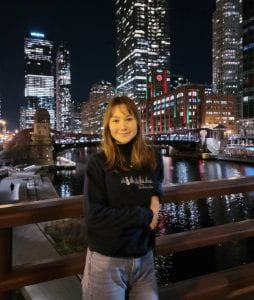
Emerging Scholars Program
Please briefly summarize your research.
My research for this upcoming summer is synthesizing the different preventative methods that have been found to decrease tobacco usage among youth in the U.S. I will be looking at the effects of social media, Covid-19, graphic warning labels, preventative media, and experimental data. I will also be analyzing laws and FDA provisions that have been passed in the last ten years to see how well the government has been doing in respect to this topic.
What made you interested in pursuing (interdisciplinary) research more broadly?
I wanted to pursue interdisciplinary research more broadly because I knew that my interest lay somewhere between marketing and psychology. I also think that to get the full picture of anything you need to look at it from multiple angles. Therefore, I think many concepts, ideas, etc. benefit from being studied from an interdisciplinary perspective.
How has it been working with faculty to transition from an assistant position to a more independent role?
The transition from an assistant position to a more independent role has been a very rewarding experience. I greatly value the mentorship that I received last summer, as it slowly prepared me to work on my own research. The whole idea of starting your own independent research project may be a daunting one, especially without a mentor. That is why I am grateful to be working with the Emerging Scholars Program, as I definitely feel a lot more prepared and confident in pursuing my own project than I did before.
What’s been your favorite part about being in a cohort with other scholars?
My favorite part of being in a cohort with other scholars is the supportive community that it built for me. Research is hard, and having others around you, that are struggling along side of you, makes the journey a little less daunting. Very grateful for my Spectacular 7 cohort!
Do you have any tips or advice for first years similar to you who are interested (but maybe hesitant) to apply for a 15 month long program?
A 15 month long program may seem like a long time, but it ends up going by so fast. By the end you are able to work on a project that you designed, based on your own personal interests. I believe that anyone who wants to get experience with research in humanities would benefit from both of the summers as the first one prepares you for the second.
Kaitlin Oh
Kaitlin Oh
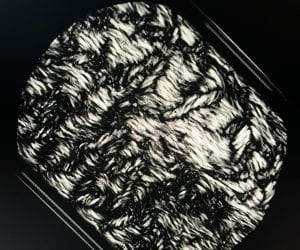
Which grant that you received do you want to talk about?
Summer URG
Please provide a brief summary of your research.
My research this summer focused on determining whether mixtures of peptide amphiphiles (PAs) with the peptide sequences A2G2 and V2A2 would result in molecularly mixed or phase-separated (non-mixing) supramolecular nanofiber assemblies. To test this, I utilized variable temperature polarized light microscopy (VT-PLM) to record the temperature at which PA fiber assemblies transitioned into spherical micelles. This transition temperature was denoted by the complete loss of birefringence signal, produced by anisotropic nanofiber assemblies, indicating a complete transition to isotropic spherical micelles.
Based on previous work, the A2G2 peptide sequence is known to form weak β-sheets that produce less cohesive nanofibers, leading to lower transition temperatures. In contrast, the V2A2 sequence is known to form strong β-sheets and more cohesive nanofibers, resulting in higher transition temperatures. Thus, increases in mol % composition of A2G2-based PAs mixed with V2A2-based PAs were expected to decrease cohesion within fiber nanostructures and therefore decrease the transition temperature. This trend was seen in my past work on mixtures of A2G2E2 with V2A2E2 PAs and A2G2E4-GIKVAV with V2A2E4-GIKVAV PAs, which indicated some degree of mixing between the PA pairs.
I chose to further analyze this trend by altering the equivalents of NaOH added to PA mixtures of the A2G2E4-GIKVAV with V2A2E4-GIKVAV PAs, which were originally prepared with 4 equivalents of NaOH. This mixture was selected in particular to better analyze the effect of epitopes like GIKVAV on the mixing of PAs. As greater equivalents of NaOH tend to reduce cohesion within a fiber assembly and therefore reduce the transition temperature, I was curious to see if the same transition temperature trend would persist in mixtures of 3 and 3.5 equivalents of NaOH as well. Under VT-PLM, the same trend in transition temperature was observed for all equivalents of NaOH, noted by a more rapid decrease in birefringence signal intensity with increasing % A2G2E4-GIKVAV. In addition, for the 30% and 50% A2G2E4-GIKVAV samples at all NaOH equivalents, there appeared to be multiple inflection points along the heating profiles; however, these inflections became less distinct with greater equivalents of NaOH. These inflection points suggested that there was a two-phase mixture at intermediate compositions of the two PAs, i.e., the appearance of a miscibility gap at lower equivalents of NaOH. Therefore, this further confirmed that rather than PA mixtures forming either fully phase-separated or completely molecularly mixed fiber assemblies, there seemed to be an upper limit on the degree of mixing between the different PAs.
To add a little context for the photos – this is a photo of the birefringence signal detected from various fiber assembly mixtures of peptide amphiphiles under a polarized light microscope (PLM).
What made you initially interested in researching your project in particular?
When I first looked into doing research, I came across the Stupp lab group’s 2021 Science paper on spinal cord regeneration utilizing peptide amphiphile assemblies. I was almost immediately sold on wanting to learn more about peptide amphiphiles and how they could be manipulated to perform such amazing feats in medicine. With my project, I had the opportunity to not only look into the mechanisms involving mixtures of peptide amphiphiles but specifically those containing one of the two epitope sequences used in the spinal cord regeneration study. Suffice to say, my project entailed an amazing and fascinating first experience in research.
What made you interested in pursuing (interdisciplinary) research more broadly?
I had never done research in the past, so I was quite curious to see what it would entail. I also have a passion for chemistry, and I was always interested in conducting some kind of lab work in the future.
Describe your experiences with research thus far. Was it tricky? What skills do you think you’ve gained?
I am really glad that I had the opportunity to conduct research in such a wonderful lab group! I learned a lot about how important and helpful working with other researchers can be for fostering new ideas for a project. I often had to present my research at subgroup meetings, and the feedback that I received from other lab members helped a lot to both answer some of the questions that came up in my project as well as provide new approaches to answering my research question. These subgroup meetings also allowed me to develop my communication and presentation skills to best explain my findings to a more unfamiliar audience. I also worked on a paper describing some of my discoveries, which allowed me to practice reading scientific papers as well as better understand my own project overall.
I would say the trickiest part about my research was making sure to keep a detailed record of my previous data and samples. Throughout the course of my project, I had made a ton of samples of various buffer solutions and peptide amphiphiles that had been used in different experiments at different times. Thus, I learned to take very thorough notes during my sample prep and data collection to make my experiments more easily reproducible.
Any tips or advice you have for students similar to you that are interested in pursuing undergraduate research?
Definitely do it! It can be a very rewarding as well as eye-opening experience into different fields of work that not many people get to witness first-hand or even be a part of. I think research is also a great way to see how what you learn in classes gets applied to real world issues/questions.
What would you name a boat if you had one?
Larry
What was your favorite childhood story (written, spoken, or film)?
Dr. Seuss’s The Lorax
What was a memorable interaction that you had on campus this week?
Said “Hi” to my former organic chemistry lab TA and he remembered me 🙂
Andres Buenahora
Andrés Buenahora
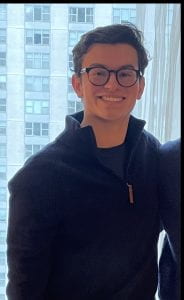
Which grant that you received do you want to talk about?
Summer URG
Please provide a brief summary of your research.
My SURG project entailed writing a dramatic play, centered around the topics of immigration, wealth inequality, and cultural perceptions of Colombians in upper-middle-class Eastern coast communities. This creative project required in-depth research into the history of immigration in the United States, financial and demographic trends among Colombian immigrant families, and the predominant factors that influence the socioeconomic statuses among those families, as it pertains to literature, film, and the historical and socioeconomic context of these issues.
What made you initially interested in researching your project in particular?
As a Latino journalist and undergraduate at the Medill School of Journalism & Integrated Marketing Communications, I came across some prevalent data indicating both the rising rates of Latino immigrants to the United States and wealth inequalities among different groups. I began to ask myself questions such as why are Latinos continually stereotyped across the media? Why has there historically been a lack of Latino representation in the film and television industry? What is driving the discrepancies in cross-generational wealth and how is race rooted in these issues?
Despite the major presence of Latino immigrants in the United States, many migrant groups continue to be marginalized and mistreated. I was interested in subverting the stereotypical narratives we’ve seen in pop culture and examining subtextual elements of class and privilege through the lens of immigration in upper-middle-class Eastern coast communities.
Henry Godinez, who served as my faculty sponsor for this project, attended a performance of my debut play last spring, which I actually wrote through a 2022 SURG. I was already a fan of Godinez’ work in Latino theatre so hearing his praise and support for my writing was very inspiring, and it was an honor to work with him on my 2023 SURG.
What made you interested in pursuing (interdisciplinary) research more broadly?
I completed a 2022 SURG, writing a Latinx social justice play that was selected by an SPP Committee and produced by The Virginia Wadsworth Wirtz Center for The Performing Arts this past spring, with my 2022 SURG faculty sponsor and Tony Award Winner David Catlin serving as the faculty mentor for this production. After seeing the success of this project, I was inspired to pursue another SURG and write my next play, conducting research for it on topics such as discrepancies in cross-generational wealth and class.
Describe your experiences with research thus far. Was it tricky? What skills do you think you’ve gained?
Like any creative or artistic project, research will always have obstacles that arise, but learning how to overcome adversity has helped me gain invaluable skills and empowered me to grow as a writer, scholar, and human in profound ways.
I’m particularly grateful to the Office of Undergraduate Research for the amazing opportunities I’ve been able to pursue during my time at Northwestern.
Any tips or advice you have for students similar to you that are interested in pursuing undergraduate research?
Pursue what you’re passionate about and above all, WRITE! I’ve had the privilege of having some incredible mentors who have been integral to my intellectual, creative, and artistic growth, and have encouraged me to continue writing even after the grant period. I would recommend first identifying your area of interest to find the right mentor who can help you develop your passion project and refine your work through a SURG.
What would you name a boat if you had one?
Buena Hora
What is something that you could give a 10 min presentation on right off the cuff?
New Girl
If your (speaking) voice were an instrument, what do you think it would be?
Acoustic Guitar
What was your favorite childhood story (written, spoken, or film)?
Up
What was a memorable interaction that you had on campus this week?
Volunteering at a food pantry with RUF friends or catching up with my sophomore year roommate on the way to a meeting for my Latin dance group, Dale Duro!
